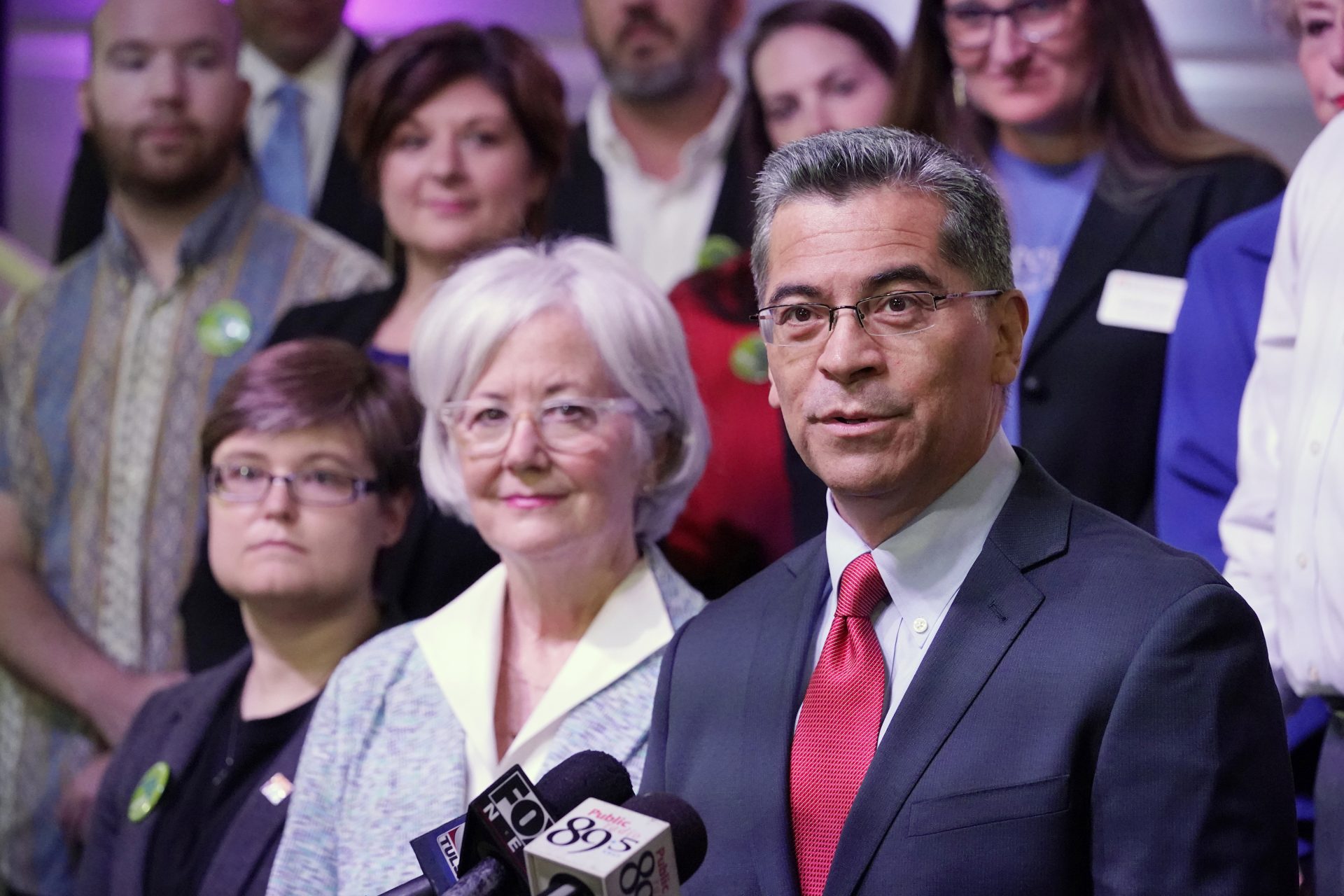
U.S. Department of Health and Human Services Secretary Xavier Becerra, right, speaks while surrounded by Oklahoma Medicaid advocates Thursday, July 1, 2021, in Tulsa, Okla., as Oklahoma expands its Medicaid program. (AP Photo/Sue Ogrocki)


U.S. Department of Health and Human Services Secretary Xavier Becerra, right, speaks while surrounded by Oklahoma Medicaid advocates Thursday, July 1, 2021, in Tulsa, Okla., as Oklahoma expands its Medicaid program. (AP Photo/Sue Ogrocki)
After more than a decade of advocacy and resistance, Oklahoma’s Medicaid expansion is now in effect.
Enrollment opened in June, and more than 100,000 Oklahomans successfully entered the program. Their benefits became available June 1. That date drew national attention. U.S. Health and Human Services Secretary Xavier Bacerra came to Tulsa that day to commemorate it.
“It is a great day to be in Oklahoma,” he said. “July 1st is going to go down in history because Oklahoma becomes the 39th state now to join its colleague states in expanding access to peace of mind.”
It’s been a long time coming. Advocates for expansion have urged officials to open the program to more low-income adults for more than a decade. Voters forced their hand last summer, when they approved State Question 802 and placed the policy in the state’s constitution. That means the Legislature can’t reverse it.
A woman named Gayle was one of several people who weighed in during the Oklahoma Policy Institute’s recent Countdown to Care event. The progressive think tank is based in Tulsa and has been one of Medicaid expansion’s top proponents.
“I’m so thankful … I could actually go see a doctor,” she said. “I’ve been in pain for over five years. Not being able to see the doctor was horrible. To see a doctor — and I could get my teeth fixed. I can get those glasses. Now, finally, after all this time, I get to get help. And I think everybody else should do this, too, so they can be helped — just like me.”
Medicaid is a program that uses state and federal funds to cover health insurance. Traditional Medicaid is open to a pretty narrow section of the population — mostly children, seniors and disabled people. Under the Affordable Care Act, states had the option to open that service to more low-income adults.
Under traditional Medicaid, young adults would have to either be pregnant or caretakers to qualify, and caretakers had to earn less than $400 a month. Now, workers in single households can earn up to $27,000 a year, and a family of 4, about $56,000 and still qualify.
State officials estimate about 200,000 Oklahomans now qualify for services since the program expanded. Katelynn Burns, a spokeswoman for the state’s Medicaid agency, the Oklahoma Health Care Authority, says they’re not quite there yet.
“We currently have more than 133,000 individuals who have been approved for benefits through expansion since June,” she said.
She says a majority of the people who have already enrolled are women — nearly two thirds. The age ranges are pretty evenly distributed, and so are urban and rural members. Although benefits kicked off on July 1st, enrollment didn’t close. Oklahomans can still apply online or over the phone.
For years, Oklahoma has ranked second to last in the nation for its insured rate. Only Texas had a higher share of people without health insurance. That’s changing.
“For the more than 500,000 Oklahomans who still have no insurance, there’s some good news because close to 200,000 of you will now have access to it, as a result of your vote and the Medicaid expansion that starts today here in the great state of Oklahoma,” Becerra said.
There’s still work to do. About 65,000 Oklahomans who qualify for Medicaid expansion haven’t enrolled. New members will have to learn how to use their benefits. All the while, the state’s executive branch is still working on its plan to bring in private insurance companies to administer Medicaid. That plan, named SoonerSelect, was nearly finalized, and four companies were given the contracts for $2 billion in Medicaid spending. Then the state supreme court ruled the program didn’t have proper legislative approval. Gov. Kevin Stitt and his administration say they will continue their efforts to bring managed care through private insurance companies to Oklahoma.